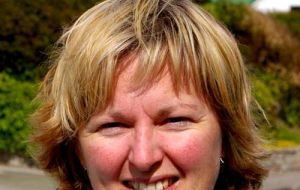MercoPress. South Atlantic News Agency
Record levels of Illex activity reported in the Falklands
 Dr. Clausen: Low squid prices show the need of Argentina's cooperation
Dr. Clausen: Low squid prices show the need of Argentina's cooperation Berkeley Sound in the Falkland Islands, a large natural harbour to the north of Stanley and within relatively easy reach by launch, is where boats fishing within the Islands' Conservation Zones, or on the high seas, come when their freezer holds are full to transfer their catches to larger refrigerated cargo ships or 'reefers'.
According to figures released by the Fisheries Operations Department of the Falkland Islands Government on Wednesday, there have been 522 individual transhipments of frozen Illex argentinusto some 87 'reefers' in Berkeley Sound since the season for this squid opened on February 15th. Illex argentinusis sold principally into Asian markets and caught principally by specialised ships called 'jiggers' which rely on powerful halogen lamps to attract the fish to lures deployed from gantries all along the vessels' sides. Such is the intensity of the light produced by these ships that Berkeley Sound is lit up like a city and at night the glow can be seen from miles away. With the season usually closing in mid-June, the rate of arrival of 'jiggers,' has now slowed down from some eight to ten per day to just three on the morning of 30th May. However the number of transhipments recorded in Berkeley Sound to this date is just short of twice the number made in the whole season last year. Speaking last week on the Falkland Islands Radio Station's News Direct programme, Falkland Islands Government Director of Fisheries, Mr. John Barton, described the level of transhipment activity as "approaching a record figure" and ascribed this to the increased quantity of Illexsquid around this year. In Falklands' waters, he said that the catch rates were very good, with up to about 150,000 tonnes of squid being taken. In addition to those vessels fishing under licences issued by the Falkland Islands, Mr.Barton said that many of the vessels coming into Berkeley Sound to tranship had been fishing on the high seas, which was an indication that catch rates must have been at "near record levels" there also. Transhipment fees from these vessels had been estimated at £120,000 for the year, but had already reached over £400,000. Reference to the quantity of Illexsquid available in the South West Atlantic this year was made by Dr.Andrea Clausen, the member of the Falkland Islands Legislative Council holding the Fisheries portfolio, during last week's Budget Session. Dr.Clausen said that it had been reassuring this year to see Illexback in such high quantities, but disappointing, that the Falkland Islands seemed further away than ever from resolving issues of co-operation with their neighbours on this valuable fisheries resource. She continued: "Unfortunately these high volumes of catch have a bad impact on market prices. For both conservation and commercial reasons, it is sensible to operate in a climate of sustained lower-level catches. It is interesting that fishermen in Argentina are bemoaning the fact that the markets are flooded and that the abundance of Illex is resulting in falling prices and some of them facing bankruptcy. There is, and always has been, a solution to this dilemma, which is consistent with international law and that is the establishment of a regional fisheries management organisation, which can objectively look to the sustainable management of the South-West Atlantic Illex resource. So long as this does not exist and the Argentine Government continues to ignore the situation, there will be both commercial and environmental repercussions."John Fowler (Mercopress) Stanley



Top Comments
Disclaimer & comment rulesCommenting for this story is now closed.
If you have a Facebook account, become a fan and comment on our Facebook Page!